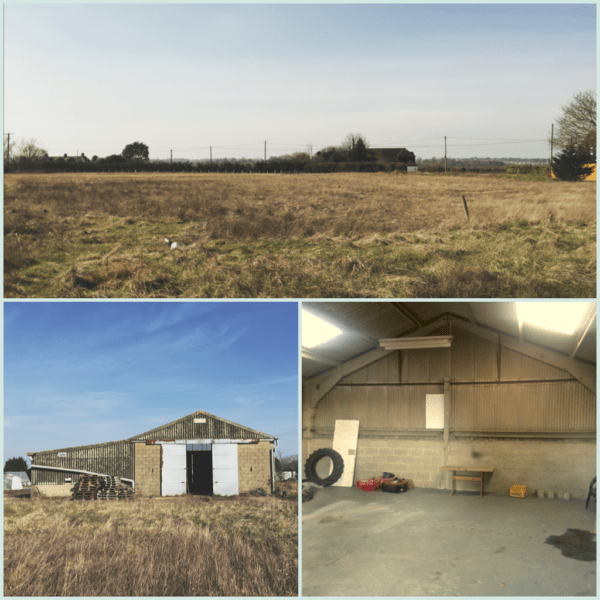Over the last year, we’ve had our eyes on 6 acres of unused land and buildings that sit adjacent to our farm. We were recently excited to have the opportunity to tender to lease this from the owners, Surrey County Council, who we rent our current land from.
With the additional land and buildings, our hope was to increase our horticultural production and take steps to start value-added production activities that increase the value of our products. As well as greater production capacity, the additional land and buildings would give us some much needed storage and help us be better equipped to support the local community through our educational activities. It also provided the opportunity for us to expand our Farm Start Food Business Growing Incubator and even have farm animals such as chickens and pigs. In short, it was a rare opportunity for our farm to secure space that opens up all sorts of possibilities that would make our farm more exciting and help move towards financial viability.

We put a huge amount of work into the proposal which took the form of a Supplementary Business Plan. We’ve made this publicly viable (click here to view), because we’re proud of it and think it may be useful for other community farms. One of our advisors, Rebecca Marshall from the Community Land Advisory Service said it was one of the most comprehensive land proposals she’d seen – and we know she’s seen a lot!
You know that wrenching feeling you get when you hand in an brilliant piece of homework and it comes back with red pen all over it and the words FAIL? That’s how I felt when I heard the news we were unsuccessful. Despite all our hard work, competition was stiff and someone else was chosen.
We’re obviously disappointed. However the purpose of this blog post is not to lament or moan, that’s not going to help anybody. There is perhaps some comfort in the news. The first comfort is that our farm stays relatively simple and our workload is not about to shoot through the roof as we get to grips with a new area. We can stay focused on what we have, which may be enough given our youth as an enterprise. After all, we’re still making adjustments to improve our cropping calendar and the site can be better organised and tidier.
The second comfort rests in the numbers. In preparing the Supplementary Business Plan we did a lot of number crunching. When it came to the expected income from growing, we found out that doubling our growing area offered only a small financial incentive. The profit margins on production are that low. However this was a conservative analysis and excluded opportunities such as increasing polytunnel area, where we can get a much higher income. The major income potential rested in opportunities from the buildings and the increased social and environmental activities that we can do with the community.
With the above reasoning, there is fair argument that perhaps things turned out for the best. In truth, there is no right or wrong answer. We are opportunistic as an enterprise. In this case, we saw an opportunity and took a well-considered punt. If successful, it could have transformed our farm and helped us take a step towards being more viable. But it could have also been a big ball-ache that left us exhausted. All we can do now is go back to the drawing board and keep plugging away, shaping our farm into the best enterprise we can.
The road will be tough but we are determined. We are not aware of any community farm in the UK that has a comfortable set of accounts. Food production is like that. We exist within a food system that is vulnerable and broken from many angles. We believe resilient local food systems are critical for a sustainable future and we will keep trying to make our farm an exemplary model. As we go, we need your help. So friends, family and supporters, please keep buying our produce, visit our farm and when we release them, buy a share.
Samuel Smith, General Manager
Postscript: we have since received feedback from Surry County Council on our application. It was explained that although our tender was very comprehensive, they chose an applicant who put in for all the lots, which included a house that we couldn’t afford or risk taking on. The idea being that it’s easier for them to manage one tenant rather than two. In addition, they said that the other applicant offered a “very impressive level of rent” as well as a plan that offered economic and social benefits to the area. During this process, we were pleased to learn that Surrey County Council considered social and environmental factors in their tender decision making process. This was stated in the original tender pack and according to our land advisor, Rebecca Marshall, this is extremely rare.
While the legal documentation is still not completed, Surrey County Council can’t comment on the proposed usage of the land but mentioned it wouldn’t be in competition with us. This signals livery but we’ll have to wait and see. Our hope is to see more horticulture next door and we know several of the applicants were proposing this. We wouldn’t see this as competition. We would see this as a good thing for a variety of reasons, most of all, it would mean more local food production – which is what’s central to our mission.